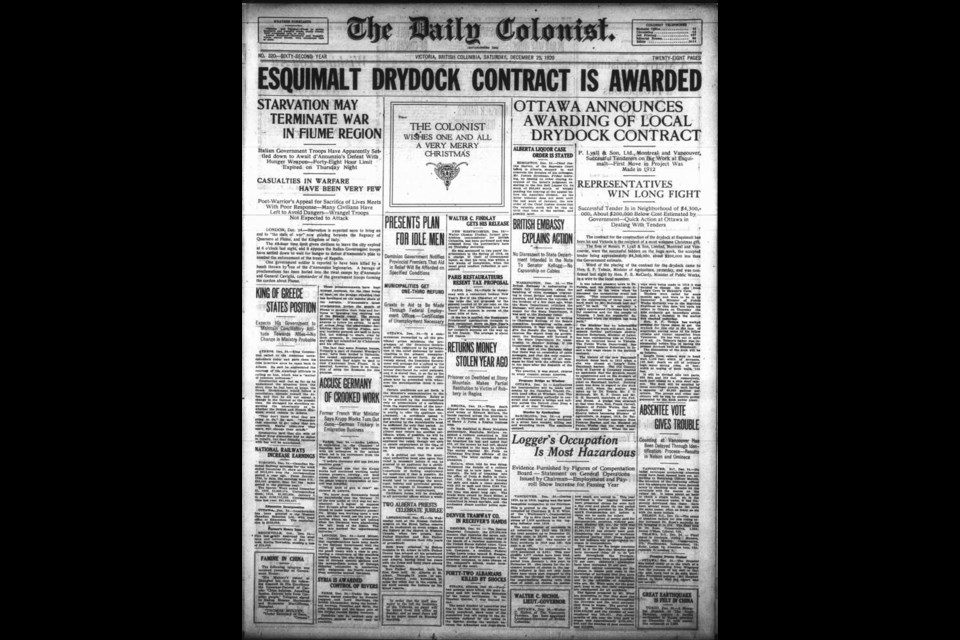If anything can be learned from history, there might be no better example than Christmas in 1920, a century ago.
There was much to celebrate this week in 1920, as can be seen in the pages of the old Victoria Daily Times and the Daily Colonist. Even more telling was that one word, a word that had caused so much fear in 1918 and 1919, did not appear in the news columns of either newspaper in the days before and after Christmas. That word was “influenza”.
The H1N1 flu pandemic, which lasted from February 1918 to April 1920, killed about 50 million people around the world. It infected 10 times that number, in four waves. It remains the most severe pandemic in history — but by Christmas 1920, the world had moved on.
There was still much to be done as we recovered from the Great War. Its impact was still being felt in Victoria.
Craigdarroch, at the time a home for men injured in the First World War — the “maimed and sick returned men,” as the Victoria Daily Times put it — was busy.
A special dinner was offered to the men on Christmas Eve. Trays for bed patients were loaded with delicacies to suit the most fastidious appetite. Miniature trees were placed at each bedside. The next morning, the Silver Band of the Salvation Army played carols. Miss Thain’s orchestra played during dinner.
On Christmas Day, a special dinner for 75 men was offered by the Veterans of France. They toasted King George V and sang the national anthem. “Following the serving of the dinner, some of the boys volunteered to wait on the ladies, while others saved them the trouble of washing up,” the Times reported.
The Great War Veterans Association presented a Christmas concert on Boxing Day at the Pantages Theatre on Government Street. At least 200 people had to be turned away because the theatre was at capacity.
Santa Claus visited the children’s ward at the Jubilee Hospital on Christmas Eve. A tree towered to the ceiling, and gifts were given to all of the children.
The Friendly Help Association gave hampers to 125 needy families. Without those efforts, the Daily Colonist reported, some families would be “toyless, dinnerless and friendless” at Christmas.
Victoria city council held an emergency meeting to discuss ways to provide relief. The plan was to distribute food and clothing to families in distress, and to men and women who had been unable to find work and were in need.
Council members tried to create jobs for the unemployed. A sewer line under construction on Johnson Street would offer work for local men, and councillors thought of another idea, one that would relieve the fuel shortage. Simply put, men would be paid for cutting logs on beaches for fuel.
Major developments that week changed the look of the region.
On Christmas Eve, we learned that a $4.3 million contract for a drydock at Skinner’s Cove in Esquimalt had been awarded — a drydock that is still in use, operated by the Ralmax Group of Companies.
There had been plenty of talk of a new drydock since 1912, but nothing much happened until 1919, when Skinner’s Cove was named as the site. Much of the credit for the progress was given to Victoria MP Simon Fraser Tolmie, the federal minister of agriculture.
On Dec. 27, the city engineer’s department started building a pile driver to be used in the construction of the new Johnson Street Bridge. The bridge was completed three years later and was in service for almost a century.
Lieutenant Governor Walter Cameron Nichol was sworn in on the morning of Christmas Day in Vancouver. He followed Edward Gawler Prior, whose death in office on Dec. 12 had left a backlog of work for his successor.
Nichol was the first lieutenant governor from Vancouver. When he left office in 1926, he retired to Miraloma, his country home in Sidney. He died in 1928.
Nichol held the office through the start of a period of sustained prosperity and optimism. The decade became known as the Roaring Twenties.
With new technology such as automobiles, motion pictures and radio, everything seemed possible. The hard times of the pandemic were left behind as the world rushed to enjoy the newfound freedom.
H1N1 is not the same as COVID-19, but a pandemic is a pandemic. In a time when medicine was much more primitive, communication took longer, and there was less awareness of what had to be done, the world managed to beat the flu and move on.
This year, as we celebrate Christmas, we should remember that as difficult as things are now, they will get better. There might be a few more bumps on the COVID road, but we will get through them.
It’s doubtful that the people who asked for help from the Friendly Help Association in December 1920 could have imagined that good times were right around the corner. But they were.
Stay strong. Let’s do all that we can to fight this virus, and reduce its spread. We, too, can look forward to better times ahead.
And please, have a merry Christmas.



